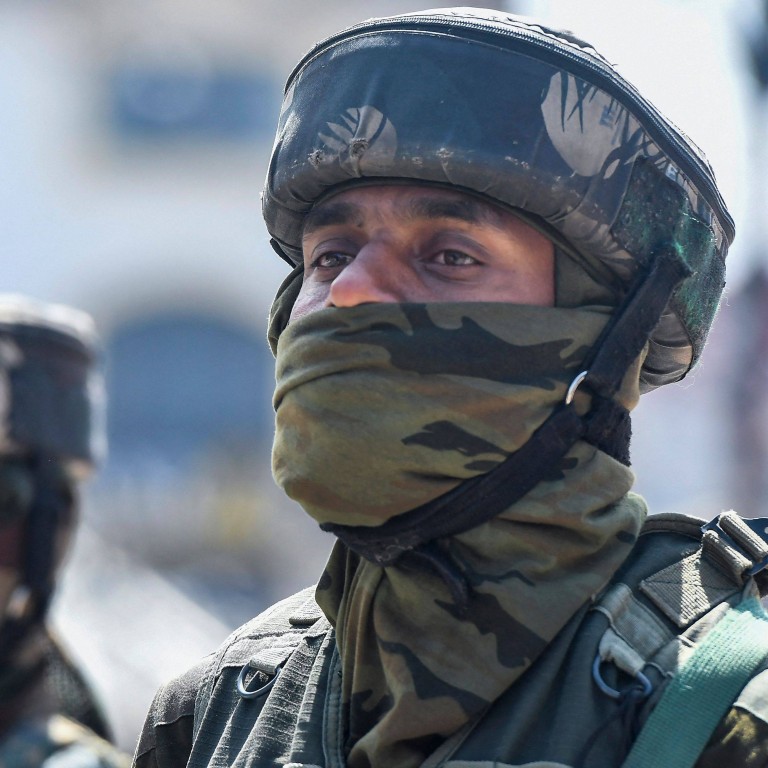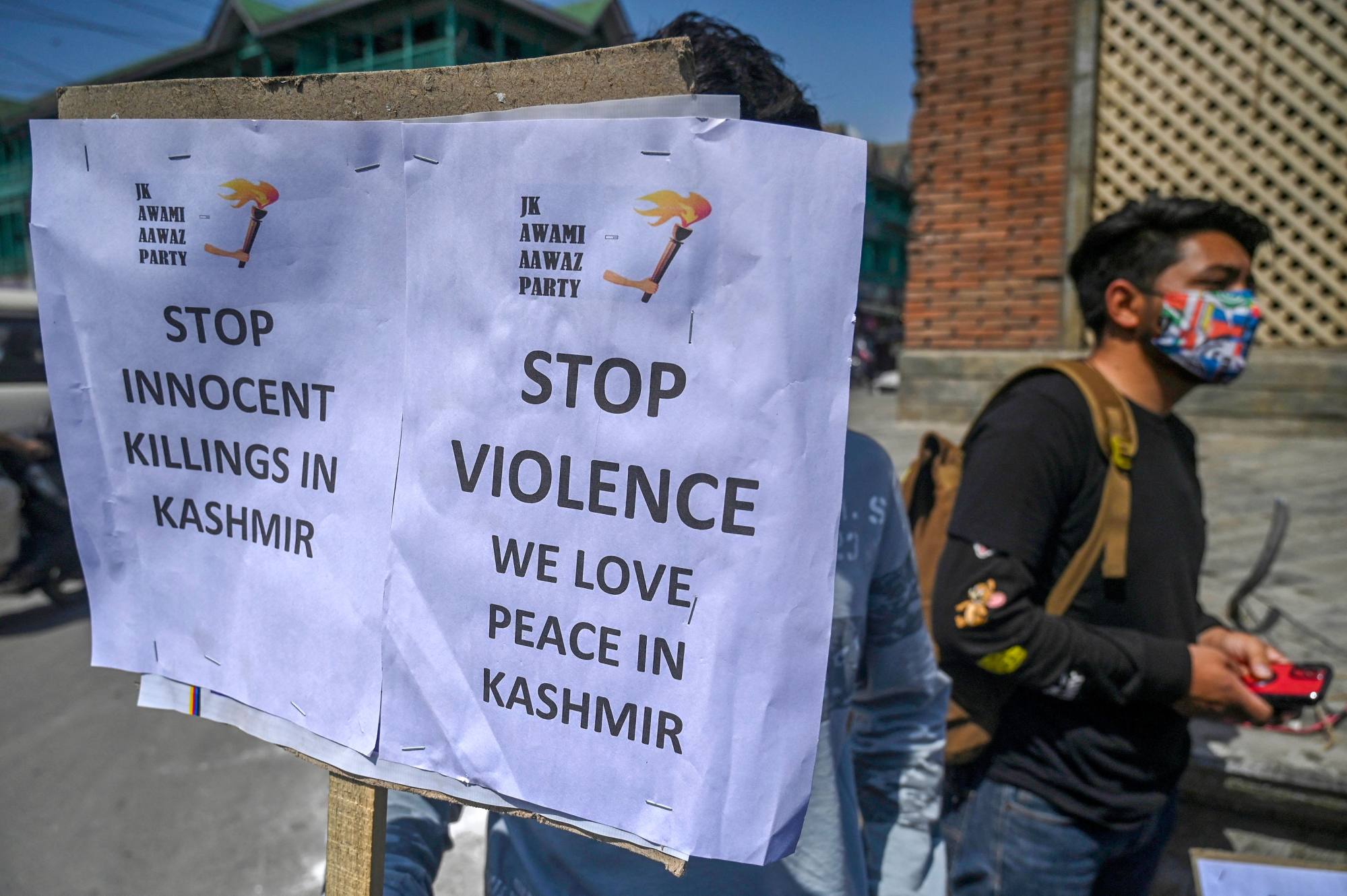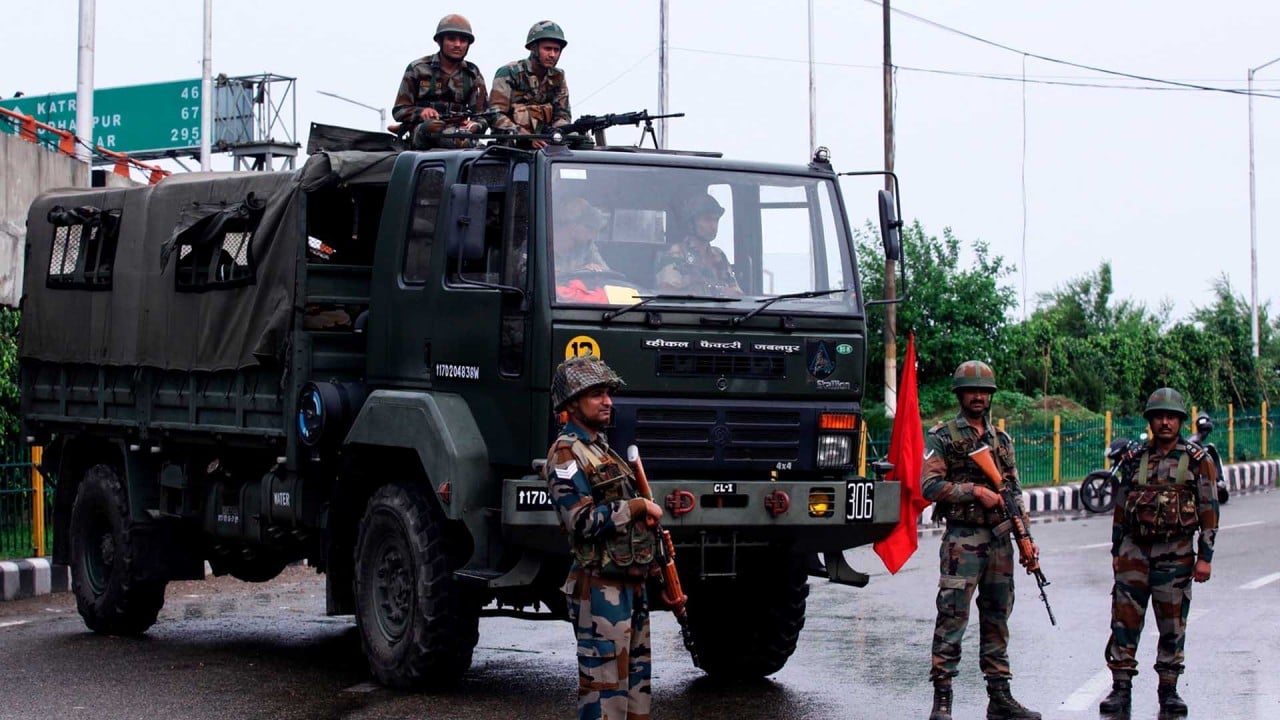
Hindu banker and labourer from India killed in Kashmir in wave of assassinations
- Rattled by the recent spate of killings, scores of Hindu families, including those from the minority Kashmiri Pandit communities, have begun fleeing Kashmir
- For 30 years, rebel groups have fought Indian soldiers deployed in the Muslim-majority territory, demanding independence for Kashmir or its merger with Pakistan
Assailants fatally shot a Hindu bank manager and a worker in targeted shootings in Indian-controlled Kashmir on Thursday, according to police who blamed the attacks on militants fighting against Indian rule of the disputed region.
Militants shot and wounded two Hindu workers at a brick factory near Chadoora town on Thursday night, Jammu-Kashmir police said in a statement. They were taken to a hospital, where one of the workers from India’s Bihar state died.
Earlier on Thursday, suspected militants shot and killed a bank manager, Vijay Kumar, in southern Kulgam district, a separate Jammu-Kashmir police statement said. Kumar, from India’s Rajasthan state, died at a hospital following the shooting.
CCTV footage circulating on social media shows a masked assailant walk into the bank and fire shots at Kumar with what appears to be a handgun.
Modi touts development projects on first trip to Indian Kashmir since 2019
Muslim-majority Kashmir has witnessed a spate of targeted killings in recent months. They come as Indian troops have continued their counter-insurgency operations across the region amid a clampdown on dissent and media freedom, which critics have likened to a militaristic policy.
On Tuesday, suspected militants, also in Kulgam, shot and killed a Hindu schoolteacher, Rajini Bala.
After that killing, Hindu government employees staged protests in several areas, demanding the government relocate them from Kashmir to safer areas in the Hindu-dominated Jammu region. They accused the government of making them “scapegoats” and “cannon fodder” to showcase normalcy in the region and chanted slogans like “The only solution is relocation.”
Hundreds of Hindus who had returned to the region after 2010 as part of a government resettlement plan that provided them with jobs and housing fled the Kashmir Valley after the killing of Bala, according to Kashmiri Hindu activists. Some 4,000 Kashmiri Hindus, who are locally known as Pandits, have been recruited for government jobs under the programme.

Those employees have been on a strike since May 13 after a Hindu revenue clerk was killed inside an office complex in Chadoora town.
In the aftermath of the clerk’s killing, hundreds of Pandits – an estimated 200,000 of whom fled Kashmir after an anti-India rebellion erupted in 1989 – organised for the first time simultaneous street protests at several locations in the region demanding better security.
“We were tricked into thinking that the government is rehabilitating us under an employment package,” said Jyoti Bhat, a local Hindu teacher who joined the programme seven years ago. “It’s turning out to be a death package.”
Kashmir is divided between India and Pakistan and both claim it in its entirety. Most Muslim Kashmiris in the Indian-controlled portion support the rebel goal of uniting the territory, either under Pakistani rule or as an independent country.
One dead, more than 20 injured in grenade attack at Kashmir market
When Kashmir turned into a battleground in the 1990s, attacks and threats by militants led to the departure of most Kashmiri Hindus, who supported India’s rule, with many believing that the rebellion was also aimed at wiping them out.
Most of the region’s Muslims, long resentful of Indian rule, deny that Hindus were systematically targeted, and say India helped them move out or allowed their flight to cast Kashmir’s struggle as Islamic extremism.
Those tensions were renewed after Prime Minister Narendra Modi came to power in 2014 amid a sharp rise in communalism in India, and the Indian government pursued a plan to house returning migrant Kashmiri Hindus in new townships.
Muslim leaders described such plans as a conspiracy to create communal division by separating the population along religious lines, particularly after India stripped the region’s semi-autonomy in 2019 and removed inherited protections on land and jobs amid a months-long lockdown and communication blockade.
Last year, suspected rebels killed a minority Sikh and several Hindus, including immigrant workers from Indian states, in a wave of targeted shootings in the region.
The killings came after India enacted a slew of changes in 2019, such as issuing “domicile certificates” to Indians and non-residents, entitling them to residency rights and government jobs. Many Kashmiris view such moves as aimed at engineering a demographic change in India’s only Muslim-majority region.
Many Muslim village councillors, police officers and civilians also have been killed in targeted shootings during the period.
“It’s a disastrous situation. It’s not just the [Hindu] employees who are in panic. We all are living in constant fear since 2019,” said Sanjay Tickoo, a local Kashmiri Pandit activist, who like some 800 other Pandit families did not migrate from Kashmir in the 1990s but chose to stay behind to live with their Muslim neighbours. He said that New Delhi’s 2019 changes in Kashmir brought “demons of hate and division” back to the fore.
“Killings in Kashmir happen as communalism is fast rising in India,” he said. “If there is another large-scale migration [of minorities] from Kashmir to other parts of the country, it will create more difficulties for Muslim minorities in India. Minorities are vulnerable everywhere.”
Additional reporting Reuters, Agence France-Presse


